One of Europe’s smallest countries batteling with one of Europe’s highest unemployment rate
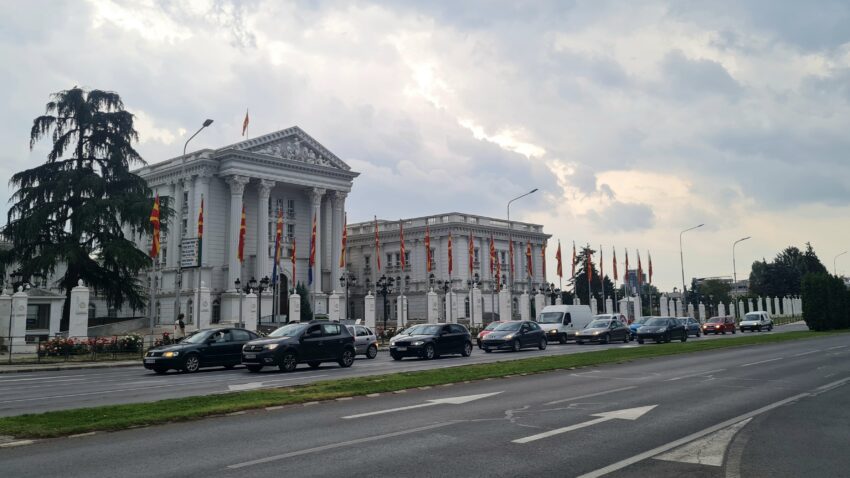
by Teresa Schachtl | 13.06.2022
“You can not only blame the government, you also have to blame the people,” say two 19-year-old students from North Macedonia in an interview about the youth employment situation in their country. 36.9% – that is the latest estimation of the youth unemployment rate. Following reasons like corruption and bad governance the country is now struggling with frustrated young people and emigration.
It is a Saturday evening and the café close to one of North Macedonia’s Macedonian Square is just about a third filled with people drinking coffee and chatting. The only thing that makes it feel busy are the people who only come in to take-away beverages or to ask for money.
While having the interview three people approached the table – when one of them started talking, it became apparent that she is not only fluent in her mother tongue, but also in English and German. She elaborates that she used to live in Germany, why she is not using her skills but walks around asking for money is something she decides not to answer.
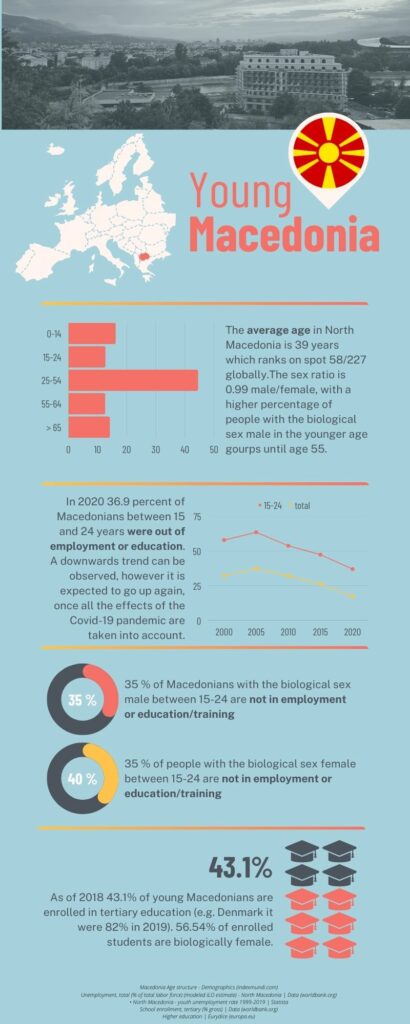
According to the students Angela Boskoska and Katerina Nikolovska this is a prime example of the work mentality of young people in their home country. Low wages, bad education and a lot of bad governance are source of frustration and lack of motivation to educate oneself and look for a job.
North Macedonia’s issue with youth unemployment
Looking at the countries complicated history, their fight to join the European Union and issues within as well as with neighbouring countries, it becomes obvious that this problem does not have a simple single line explanation. After the percentage of young unemployed people declined for years and years, the positive trend stopped and the latest estimation from 2020 is that 36.9% of 15–24-year-olds are NEETs – not employed or in education/training.
Aleksandar Karatosho, European young ambassador and founder of the non-governmental organisation Youth Empowerment Association (YEA), estimates the number to be even higher – as it only mirrors the number of people actually looking for work. Since the pandemic many young people are not actively searching for labour and education anymore, thus also not appearing in the statistics.
Different to other countries in North Macedonia families are required to support their children until the age of 26. This is why finding a job is not that pressuring for young people, say the 19-year-old students Boskova and Nikolovska. According to the two students a lot of young people decide not to take the opportunities that are given to them, but rather live dependent on their parents.
Furthermore, Karatosho from YEA states that North Macedonia actually had to import work force from countries like Ukraine in the past: “That’s very weird. I mean, in economic terms, or any kind of logical form, it’s very weird to import workforce, when you have young people or basically half of the country that is are looking for jobs”.

The students Boskoska and Nikolovska themselves have so far not struggled to find work, however since they are planning on going into journalism and film making in the future they are also set on eventually leaving their country. “We will not earn enough money here and people still think that what we want to do is just a hobby”. It is not only salary or the lack of opportunities that await them later on the job market, but also seemingly problems with the educational system: “The professors are not invested at all, they don’t show up to class and are constantly on strike – they are fighting for more money for a job that they are not doing properly.”
Another prime example for this desire to leave North Macedonia is Angela Damcheska’s story, a 28-year-old from Skopje, who explains that she is in between jobs right now and will go to Germany for the summer to work there as a cleaner. “[In Germany] we are working very long hours for 12 hours maybe but we know that we will get paid very well for that”. She and her boyfriend have done that for a couple of years now and are trying to get a visa to stay in Germany permanently, so far without any success.
Why the system seems unfair to the affected people
Petar Barlakovski, President of the non-governmental organisation Youth Educational Forum, explains that young people are disadvantaged in terms of their rights. They often work without contracts or are assigned tasks that are not covered by their original agreement. Moreover they are not given fair chances by the companies in general: “Companies offer really low wages to young people because they see them firstly as young which in their eyes per default means, you should give someone less money since he is young”.
Barlakovski’s organisation is working on policy proposals and trying to influence politicians so that special laws protecting and supporting young people will be implemented. Recently they tried to get a tax relief for young people, though this project failed.
“I would say that the percent of young people who do not want to work, they do not want to work under conditions that are not adequate in the 21st century. So I’m speaking of not respecting their workers rights, giving them a lower salary, not being responsible towards the workers when it comes to giving them their tasks”
Petar Barlakovski
This problem with working conditions is also one of the reasons Damcheska decided to quit her last job and search for work in Germany. She complains about a toxic work environment and talks about minor and major things that are in her opinion not comparable to Macedonian standards and, as she says, just not fair: “It is kind of discriminating towards the smokers. You cannot smoke in the yard of the factory, you have to go outside on the street to smoke. And everyone who wants to leave has problems after that. Like it is a big company and if they pick on you for something they can sue you because agreements we sign are very specific and are very not according to the law in Macedonia, which is weird. I don’t know how they do it”.
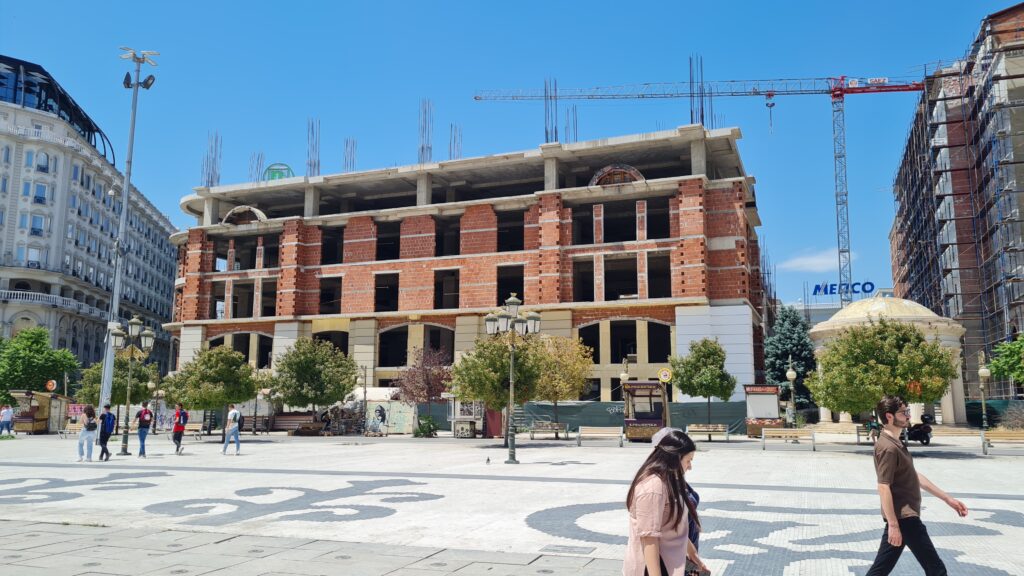
The second dimension of why people are struggling is the corruption in government circles, as mentioned by Barlakovski as well as Karatosho. According to Transparency International North Macedonia ranks on 87/180 with a score of 39/100 in 2021, which is 4 points under the global average and one of the lowest scores in Europe. This problem existed with more or less with every government so far in North Macedonia.
“We try to say to the government that they need to address these issues right away […] I have friends who have university degrees and may freely and very easily find the work here, but they just don’t want to because they know how the society works and know that there’s lots of corruption and etc. So that really infuriates them.”, adds Barlakovski.
Damcheska, the young woman from Skopje, elaborates that even though she studied to be a teacher of Macedonian language, she can not work in this field, because it is dependent on the fact if she is a member of a political party and how active she is in the work for them. “So everything is about politics, with whomever you sit and talk.”
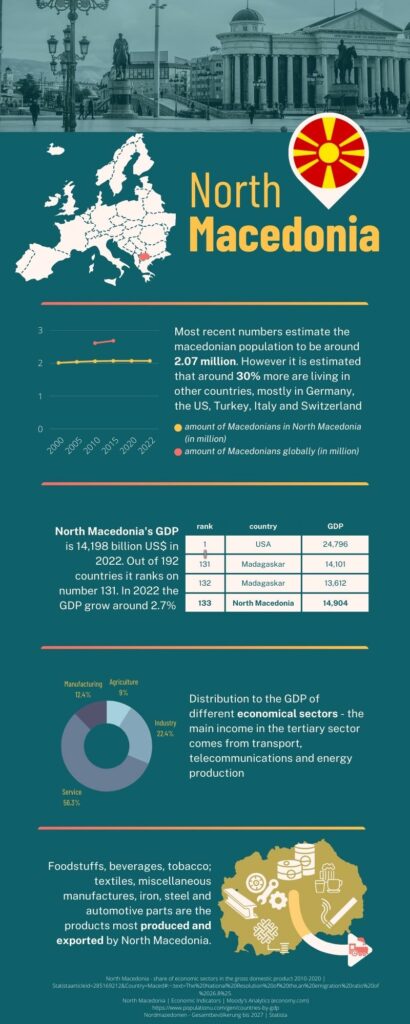
Even as recently as earlier this June, the North Macedonian government published a plan for a public administration reform that the agency for youth and sports should become part of the Ministry for political systems or community relations and therefore give up their status as an independent organisation.
Filip Kulakov from the National Youth Council of Macedonia explains that his organisation sees that critical and took heavy action to prevent this fusion to happen: “civil society organizations have ranked [the Ministry for political systems or community relations] the lowest in terms of transparency, and basically nobody knows what they’re doing. It’s known to be just the place for political parties to employ their supporters“.
What is being done
The public administration reform is part of the Instrument for Pre-Accession Assistance (IPA) by the EU. North Macedonia was granted the candidate status by the EU in 2005 – since then they have been trying unsuccessfully to become a member. One of the biggest programs to support young people to find work is the youth guarantee implemented by the EU and the Employment Service Agency of the Republic of North Macedonia. This project persists of elements like interviews and counselling that is supposed to eventually either lead to further, non-formal education or employment. North Macedonia is the first non-EU-country to receive this kind of youth support.
When asked about whether joining the EU completely would improve the situation a lot, Karatosho comments that there is no clear answer to it: “A lot of people will leave the country because they will have a new passport. But it will surely help the economy of Macedonia and it will increase the opportunities for young people.”
Organisations like the Educational Forum of Macedonia, the National Youth Council as well as the EU and UN are trying to support young people with hands-on workshops and in-formal education and to grasp all the aspects of the issue through research and evaluations.
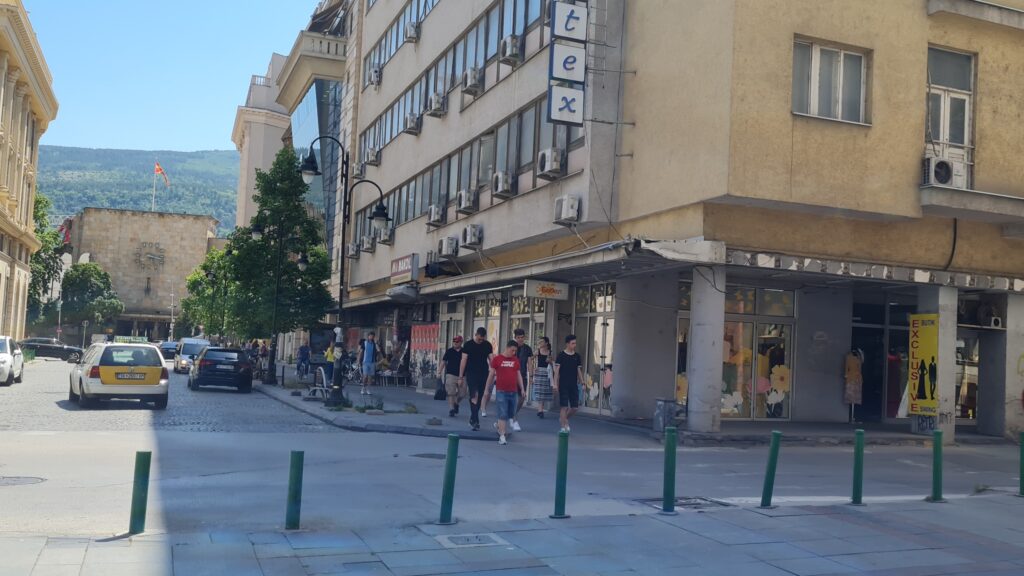
Time will tell if the upward trend in employment will continue or if recent events like Covid-19 or the war between Russia and Ukraine set back the development and if the country will solve the problem of young people emigrating.
Even though the student journalist and filmaker Boskoska and Nikolovska want to explore their opportunities in the US, Great Britain, Belgium or the Netherlands, Boskoska also talks about coming back to tell stories from her own country.
“I can imagine coming back to Macedonia and working for media here in the future. It is easier to express yourself in your own language and I would like to try to change the situation from the inside. But I don’t really know yet.”
Angela Boskoska
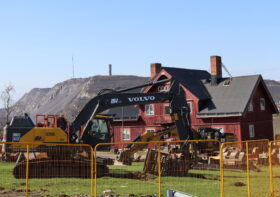

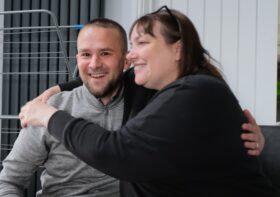
Leave a Reply